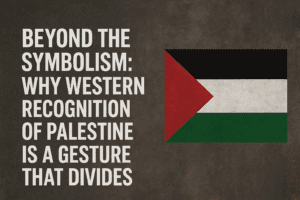Beyond the Symbolism: Why Western Recognition of Palestine is a Gesture That Divides
The recent push by Western powers to recognize a Palestinian state reflects more symbolism than substance, exposing deep fractures in global diplomacy. France, the UK, Australia, and Canada frame the move as a moral stand, but critics argue it risks rewarding Hamas and undermining fragile ceasefire talks. Israel, through its UN envoy Danny Danon, insists such gestures embolden militants while stalling genuine negotiations. The recognition also raises unanswered questions about governance, borders, and security—issues only direct talks can resolve.
Supporters claim it keeps the two-state solution alive, yet the Palestinian Authority’s weakness and Hamas’s grip on Gaza complicate that vision. Meanwhile, the humanitarian crisis in Gaza, marked by famine fears and mounting casualties, intensifies international frustration with Israel’s war strategy. Diaspora Jewry itself is showing signs of fatigue, underscoring the war’s emotional toll. Ultimately, recognition may gain headlines at the UN, but without a roadmap for peace, it risks becoming a divisive gesture that changes little on the ground.

Beyond the Symbolism: Why Western Recognition of Palestine is a Gesture That Divides
The impending recognition of a Palestinian state by several Western powers is being hailed by some as a historic moral imperative and dismissed by others as a hollow, even damaging, political performance. As France, the UK, Australia, and Canada prepare to make their declarations at next month’s UN General Assembly, the move reveals a deep and troubling fracture in international diplomacy and the painful realities of the ongoing Israel-Hamas war.
A Gesture Born of Frustration, Not Strategy
At the heart of Israel’s vehement opposition, as articulated by its UN Ambassador Danny Danon, is the argument that these recognitions are not a genuine attempt to solve the conflict but a way for “disconnected” leaders to “blow off steam.” After nearly two years of war, a staggering humanitarian crisis in Gaza, and stalled diplomatic processes, these nations feel immense pressure to be seen doing something. Recognition offers a clear, declaratory action that satisfies a domestic political base demanding a response, even if its practical impact is negligible.
This symbolic act, however, collides with a grim reality on the ground. Jerusalem’s central argument is that such recognition actively “hinders” the delicate ceasefire and hostage negotiations. The logic is that by granting Hamas a diplomatic victory—which the group itself has praised as the “fruit” of its October 7th attack—it emboldens them to make greater demands, believing international pressure will eventually force Israel to capitulate entirely.
The Chasm Between Symbol and Substance
Proponents of recognition argue it is a necessary step to preserve the vanishing possibility of a two-state solution. They see it as a moral stand against the suffering in Gaza and an attempt to actualize a political horizon that has been eroded by years of conflict and settlement expansion.
Yet, this vision is met with a series of stark, unanswered questions:
- Who exactly is being recognized? The Palestinian Authority is weak and lacks control over Gaza, where Hamas remains a potent military and ideological force, even if degraded.
- Where are the borders? Recognition does nothing to define the territories of this new state, a core issue that has doomed past negotiations.
- What about security? As Danon pointedly asked, how does recognition lead to the disarmament of Hamas? The Arab League’s call for Hamas to give up power is a statement of desire, not a plan of action.
The move essentially attempts to leapfrog over the most difficult final-status issues that can only be resolved through direct negotiation between the parties—a process that is currently non-existent.
The Unavoidable Toll of a Long War
Beneath this diplomatic clash lies the human cost that fuels it. The international community’s frustration is a direct response to the war’s grim anniversary: dozens of hostages remain in captivity, the Palestinian death toll continues to mount, and the specter of famine has loomed, exacerbated by aid blockades Israel defends as necessary but critics condemn as collective punishment.
Ambassador Danon’s dismissal of the “hunger campaign” as a Hamas fabrication overlooks the assessments of major international aid organizations. This highlights a key disconnect: where Israel sees a necessary military campaign against an insidious enemy, much of the world sees an unacceptable humanitarian catastrophe.
Furthermore, the strain is showing beyond governments. Danon acknowledged the “fatigue” within Diaspora Jewry, a telling admission of the emotional and political toll this prolonged conflict has taken on Israel’s strongest allies abroad.
The Path Ahead: More Obstacles, Not Fewer
Rather than breaking a deadlock, the wave of recognitions seems likely to deepen it. It hardens Israel’s perception that it is being unfairly pressured and rewarded terrorism, making it less likely to make concessions at the negotiating table. It also allows the Israeli government to frame the conflict as one between itself and an out-of-touch international community, deflecting from internal debates over war strategy and the future of Gaza.
The coming UN General Assembly will be a stage for this symbolism, but the real work remains unseen: the grueling, behind-the-scenes hostage talks, the military operations in Gaza, and the slow, painful process of managing a humanitarian crisis. Western recognition may grant Palestine a new diplomatic status, but it does nothing to change the facts on the ground. In the absence of a credible plan to bridge the gap between symbolic gestures and substantive peace, this well-intentioned move risks being merely a footnote in a conflict that demands so much more.
You must be logged in to post a comment.